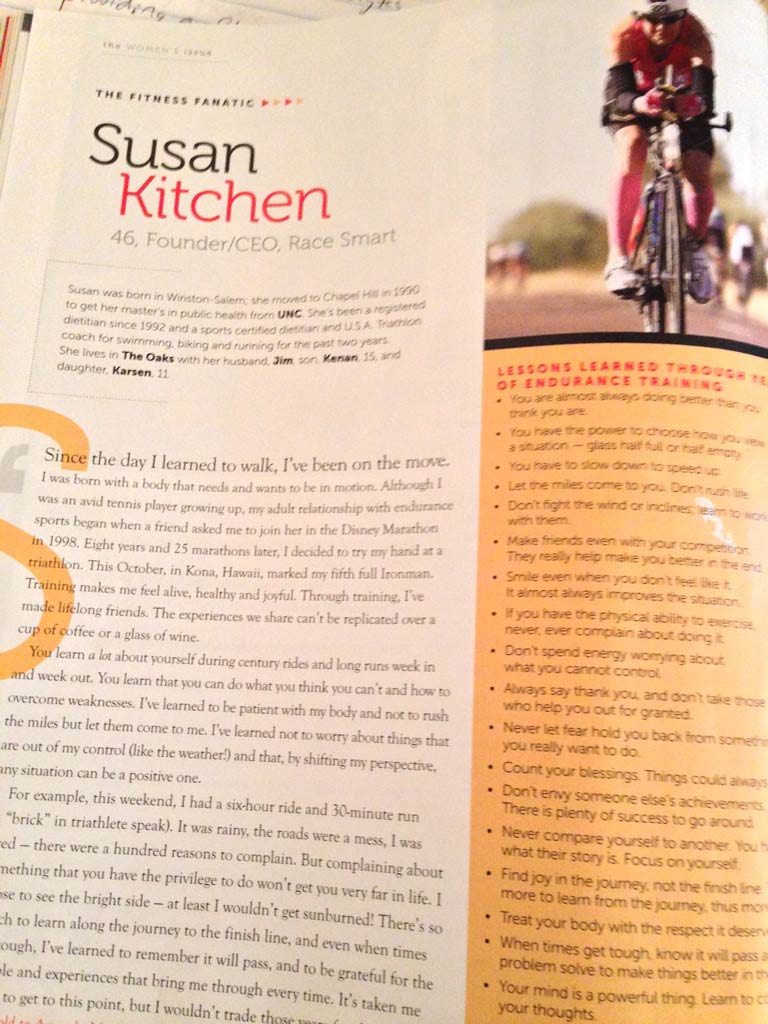The Secret Recipe to Performance Enhancement

The other day I overheard a conversation between two runners discussing training plans and weekly mileage as it related to their performance in an upcoming race. I’m not one to eavesdrop, but the conversation was eerily similar to a discussion I had recently with one of my coached athletes. Both conversations circled around “cutting-edge run workouts alongside becoming leaner to reach optimal race weight.”
Goodness… where do I start debunking? I’ll begin with the foundation–where I started with my athlete. This is a jam-packed topic that seems complicated but is actually quite simple. I’m cutting to the chase, so listen up.
There is no magic approach, training plan, sprinkle of fairy dust, cushy running shoe, or recovery cocktail that will be THE differentiator in your performance and physical ability. This is where we want to complicate the situation because there must be a secret that we aren’t privy to. I’ll let you in on the mystery; it’s not sexy, shiny, and you won’t pay $$$ for it. It’s so basic–you will laugh–but it’s the truth. More importantly, it’s crucial for longevity in the sport while balancing life and maintaining health.
Nail. The. Basics.
Master the foundational habits of your life and training with consistent quality, not quantity, and you are well on your way to shattering the glass ceiling. This is not a charge to be obsessive in your habits or routine, but instead a charge to anchor them in a solid foundation. Here are the building blocks to support both life and sports’ performance.
Daily Nutrition:
Nourishing your body with healthy, good food consistently in meals and snacks are the foundation of health; therefore, a healthy diet is the foundation of performance. Without nailing these basic habits, your labor is built on quicksand and in vain. In this article, healthy, good food simply means fruits, vegetables, whole grains, low-fat dairy, lean meats, and healthy fats. Meals serve as the main pillars of your nutritional foundation. Snacks are designed to bridge the gap between meals that are more than four hours apart or pre/post-workout.
Here are a few rules to chew on:
- Never skip breakfast; it sets the nutritional tone for the day.
- Include 20+ grams of protein at breakfast with whole grains and/or fruit.
- Don’t skimp on carbs, especially around a workout.
- Create a colorful plate at meals–think fruit and veggies.
- Lean meat or complete protein is essential for muscle repair, quality, and strength.
- Fat-free is a thing of the past. Fat in of itself will not lead to being fat. Aim for at least 1g of fat per kg of body weight/day.
- If dinner is three to four hours before bedtime, include a small bedtime snack, ideally dairy because of casein (slow-releasing) protein to support muscle anabolism, blood sugar stability, and repair/recovery while you sleep.
- Reducing food intake to the point of low energy availability will lead to injury, illness, burnout, and increased fat stores due to muscle breakdown and elevated cortisol levels. Ironically it results in the opposite outcome of the intended end goal.
Sports fueling
We don’t need to take in supplemental fuel during a workout year-round but it’s crucial in the build training phase of a race.
First, by training under fueled, we are unable to dig deep and hit the effort we are shooting for and capable of. So that begs the question, what are you getting out of the long tempo or 20+ mile run if you are running on empty? In short, you are in the red. The body will be in a catabolic state and unable to repair and recover, you’ll feel worn out and depleted. Not to mention the upcoming workouts may feel like torture and resemble a death march. It’s a silly rookie mistake – avoid it.
Second, by test driving a fuel plan in training, it’s also training your GI system to process sports fuel at race like efforts and conditions. Don’t wait until race day to find out your fuel plan wreaks havoc on the GI system. Just as you are training your body to go the distance you are also training the body to digest specific sports fuel at the specific outputs and environmental conditions.
Hydration
Did you know that dehydration is the primary cause of early fatigue? When we run in a dehydrated state, heart rate and perceived exertion are elevated. Sweat rate decreases and we risk overheating, know as hyperthermia. In this physical state, recovery is inefficient and will take much longer than if you had hydrated appropriately
As a starting point, aim for 4-6oz per 15 min and if you are a heavy sweater or it’s hot and humid, increase the amount. When running sessions are more than 60 min, water is not sufficient, you need electrolytes and fuel to keep the body properly hydrated for optimal performance, adaptation, and recovery.
Hydrate not just in training but also within your daily life.
Recover properly
After an intense track session, tempo run or long endurance run, the recovery fuel is non-negotiable. The post workout/event recovery fuel is designed to speed up the repair of damaged muscle tissue, replace glycogen/energy stores, and promote physical adaptation. Immediately following a training session, muscle cells are open, insulin sensitivity elevated, and the body is primed to absorb simple sugar and protein, so the quicker you refuel, the better.
The optimal recovery window to jumpstart the process is short, just 30 minutes! As time ticks on, insulin sensitivity declines, it takes the muscles longer to absorb glucose from the bloodstream, therefore, glycogen storage is less than optimal. This creates a stressful environment for the body.
By consuming a recovery snack within 30 min, you can extend your ability to effectively refill glycogen stores up to eight hours by snacking on carbs every couple of hours. If you skip, well, then 2-2.5 hours post workout, your glycogen stores fall to 50%. That doesn’t bode well for recovery, performing well in tomorrow’s training session or for the tidal wave of cravings that is going to hit you later.
To be clear, it’s not essential to fuel after an easy recovery workout or a walk with the dogs around the neighborhood. Consuming regular, well-balanced meals will suffice on easy or rest days. The recovery fuel is intended for an intense, long, or tough workout where you are left feeling depleted and wrung out or between multiple workouts in one day.
Ideally, take in 20-30g protein, 40-60g carbs, and sip 16-24oz fluids gradually over time. For women a 2:1 ratio is better, and men can go with a 3:1 ratio (carbs/protein). Choose carbs that are lower in fiber, low in fat, and easy to digest so they go into your system quickly.
Train smart
An essential basic in your arsenal is learning to execute and dial in the intent and rhythm of your training. Each run or workout should have an intention or mission behind why you are doing a particular session. Your fitness arsenal holds a plethora of tools such as Zone 2 steady-state endurance, strength endurance, tempo, speed, short frequency, form focused, short pickups with cadence focus, and strength, conditioning, and mobility work to support a strong, balanced body. Ultimately, the KEY to success is the mindset in and execution of your workouts.
A few tips to lean on:
- Keep the efforts easy, such as during rest intervals and Zone 1 and 2 steady state runs.
- Do not “leave your race on the track.” Training sessions are not “Race Day,” there are no medals for “winning” in a training session; save your best efforts for Race Day when it counts.
- Scale workouts when time is limited and don’t feel bad about cutting it short. Let it go. Life-Balance is vital, and sometimes life calls.
- When sick–skip your workouts. You won’t start losing fitness for 5 to 10 days. Focus on getting well and start back easily when your body is recovered.
- Those missed workouts due to life or work commitments and illness are gone. Don’t drag and drop them to the weekend when you have “time” to do the whole weeks’ worth. Workouts are spaced appropriately to allow for recovery, so making up for lost sessions is a NO GO. Once you missed them, let them go. Most coaches will re-integrate if they feel it’s an important session for you.
Get your zzzzz’s
You’ve heard this 1000 times, but it’s worth repeating – avoid chiseling away on your sleep time to be more productive. With only 24 hours in a day, it’s tough to strike a healthy balance between personal life and family, work or school, training, and getting enough sleep. But what if I told you sleep is the BEST and MOST impactful performance enhancer at your disposal – and it’s FREE! Sure, sitting on the couch is resting, but the magic happens during sleep. Both the quality and duration of sleep are vital, and the goal should be 6-8+ hours or until you wake up without an alarm clock – especially during heavy training phases. Research suggests just 2-3 nights of restricted sleep reduces muscle repair (synthesis), impairs cognitive function and immunity. On those occasions when you’re running on fumes consider trimming the workout, scaling the effort or skipping the workout all together. There is no sense in digging a deeper recovery hole that you’ll just have to climb out.
We’ll dive into sleep in an upcoming article. But for now, prioritize sleep and you’ll start to see positive changes.
Everything in moderation, including excess
As we discussed, don’t become obsessive and lose your focus when trying to nail the basics. Rather than fretting over the quantity of miles/week, focus on the quality of miles and stringing together consistent runs. Enjoy dessert, just not every night, and if you have a mishap – don’t throw the whole day or week out because of one bad apple. Be kind to yourself, focus on the process, the intention of each workout and remember there is no magic bullet. The choices we make, the rhythm and mindset we adopt and consistently apply 80% of the time is where the real magic happens.







